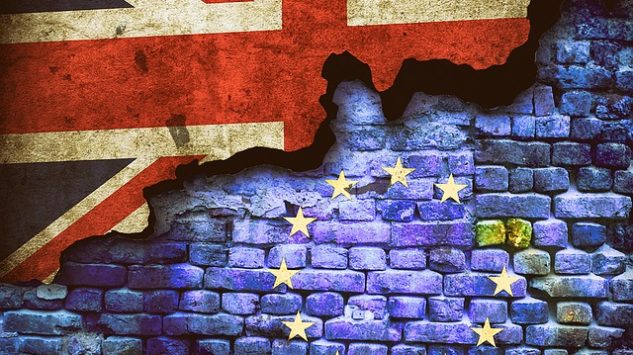Issue Briefs

Brexit Shows British Decline
June 4, 2019
Paolo von Schirach
Brexit, or the process leading to Britain’s exit from the EU, touted just a few years ago by its vocal proponents as the beginning of a new course eventually leading to a vigorous British economic renaissance, quickly turned into a mix of farce and nightmare. Three years after the historic June 2016 referendum in which a (slim) majority of Britons declared that they wanted The United Kingdom to leave the European Union, there is still no deal; while Conservative Prime Minister Theresa May, consumed by the complexities of what turned out to be a monumental undertaking, had to resign after having suffered multiple political defeats and humiliations.
Liberation
For all its sincere proponents, Brexit was supposed to be “liberation” from the constraints and slow suffocation allegedly imposed by a bureaucratic, narrow minded, stifling European Union that kills entrepreneurship and innovation. According to the Brexit gospel, Britain needed to be free from this Europe. Free to set its own course, free to pursue free trade agreements across the world, and consequently become a vibrant, attractive hub for global investors and world class companies that would want to set up shop in the UK because of the incredible opportunities created by an island nation fully wired to the most vital segments of the global economy. And this would work well, because world class companies value London as a financial hub, and because they value a cosmopolitan, agile British work force able to meet any and all challenges, outperforming less sophisticated competitors.
Renaissance
From this vantage point, Brexit was going to be the necessary prelude to a veritable “British Economic and Social Renaissance”. The very country that way back, at the end of the XVIII Century, launched the industrial revolution, the country that created global commerce, while giving all nations English as the “lingua franca” of business, trade, science, education, finance, and diplomacy was about to reinvent itself.
Free from the shackles of a demeaning EU membership, Great Britain would soar once more, showing the world how globalization could really work when a “Strong Nation” is geared to invest, dare and set a new course based on the strengths of a first class work force, the key strategic advantage of having on its soil a recognized center for global finance, (the City of London), and great academic institutions capable of nurturing world class talent.
The Referendum
And so it was. The mostly Conservative Euroskeptics who wanted out managed to put enough pressure on then Prime Minister David Cameron. Cameron, (at heart a Remain politician), miscalculated British support for continuing EU membership –in a spectacular way.
Convinced that the Remain vote would prevail, he agreed to hold a referendum on EU membership on the assumption that most voters to opt to stay in the EU. Well, he was wrong, and he resigned right after the vote. Be that as it may, after the June 2016 vote, with a green light for Brexit, the energized Brexiteers should have carried the day.
Today, almost three years from the pivotal referendum, Britain should have negotiated its “divorce” with the EU and it should be well on its way to set her own independent and bright economic future.
Different outcome
Well, none of the above. For the last three years Britain’s policy-makers showed the world that they had not agreed on what Brexit should mean. The UK Conservative government proved time and again that it cannot make hard choices, while the Labour Party opposition proved to be incapable of providing any credible alternative plan, a convincing vision of its own that could be embraced by the British public.
What does all this mean? Very simple. The wildly optimistic and hyper-simplistic Brexit blueprint proposed and successfully advocated by former London Mayor Boris Johnson and others at the time of the referendum campaign was essentially a fantasy, a dream. May be a beautiful, well presented dream. But it was a dream nonetheless.
It lacked a credible road map with clear, practical milestones describing the terms of Brexit and how the British Government could rewrite the thousands of laws, rules and regulations binding Britain to the European Union, so that all the UK stakeholders would understand how to properly refashion business and trade relations with European and other business and trade counterparts across the world.
There is no doubt that many of the fervent Brexit advocates truly believed (then and now) all the good things that would take place once Britain finally leaves this ill-conceived association with what turned out to be a mostly bureaucratic Europe. But not much has been done to engage in serious planning, (as opposed to catchy slogans), on any of this. Hence the confusion and stalemate.
Voters did not grasp the complexities
A majority of British voters affirmed that they wanted out of the EU. But they had no idea of what it would take to achieve this goal. Indeed, subsequent analysis and polls taken after the vote showed that many people, while the voted for Brexit, had only a vague idea of what would be needed to extricate Britain from the terrible EU embrace, and what the cost and the probable economic impact of the separation would be. And it turns out that this profound confusion was fully shared by the British policy makers entrusted with the monumental task of implementing Brexit.
Now, almost three years later, we see a hyper confused, tortured Britain at a standstill. British policy makers are still incapable of making up their minds: Hard Brexit? Soft Brexit? No Deal Brexit?
A fresh start on Brexit?
Of course, the (expected) resignation of Prime Minister Theresa May, defeated by a mission she could not accomplish, opens a new chapter in this sad story that at times is more farce than drama. It is now clear that May’s convoluted attempts to find workable compromises agreeable to Brussels and to her own party managed to dissatisfy almost every stakeholder.
So, with poor hapless May out of the way, can there be a new, vigorous start? Will the UK go back to square one? Back to the hard Brexit plan, while elaborating a robust global business and trade strategy for a soon to be “liberated” Britannia? May be. But I would not be entirely sure.
No Grand Plan
Remember what I said before. There never was a real post-Brexit “Grand Plan”. Back in 2016, the Brexit solution was sold to the voters on the implicit assumption that Brexit would entail a quick, easy and essentially painless process. Besides, British society was painted as a genuine thoroughbred ready for the big race. Brexit was advocated and then celebrated by all those who were and are convinced that, without the constraints of murky, debilitating EU ties, Britain could once again flourish.
But if all these rosy assumptions are mostly a fantasy, then a new Prime Minister willing to finally cut the ties with the EU, whatever the cost, may set in motion new dynamics possibly yielding adverse results. If Britain is not so unique, after all; if it is like most of Europe: sclerotic, risk averse and enamored with subsidies and welfare, then the economic shock of losing preferential access to the EU market may be too big.
Can Britain do this?
I would like to believe that Britain, now at last on a firm Brexit course, will be able to handle the challenge and withstand the short and medium term negative impact of new tariffs and restrictions in its vast trade with Europe.
If London can indeed develop new global markets, starting for example with a free trade agreement with the United States, a new post-EU Grand Strategy may very well provide huge benefits that compensate for the short term losses in Europe.
That said, Britain needs a gutsy, visionary leader who can convincingly articulate this ambitious new vision in a way that it will inspire confidence, while encouraging enthusiastic support. Such leaders are rare, in Britain and elsewhere for that matter.
I wish Great Britain good luck. The stakes are incredibly high. If a decisive Brexit proves to be too much for a timid, risk averse British society incapable of successfully pursuing an alternative global strategy, the sad decline of what was once a Great World Power will be hastened.
The views and opinions expressed in this issue brief are those of the author.
 |
Paolo von Schirach is the President of the Global Policy Institute and Chair of the Political Science and International Relations Program at Bay Atlantic University www.bau.edu. He is also the Editor of the Schirach Report www.SchirachReport.com
|